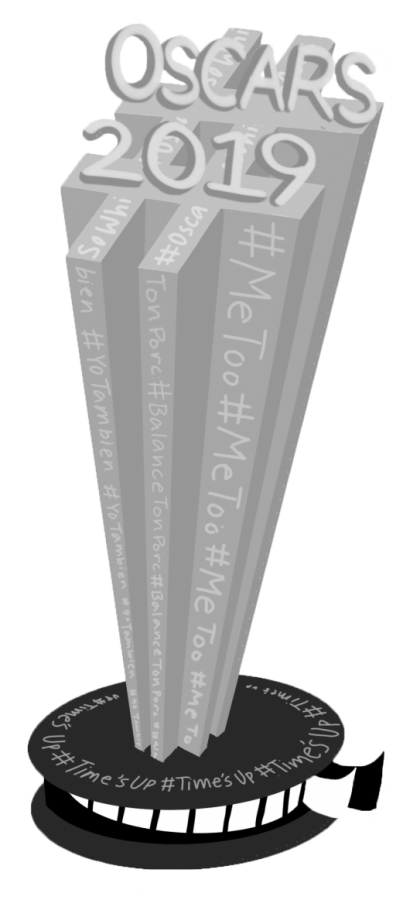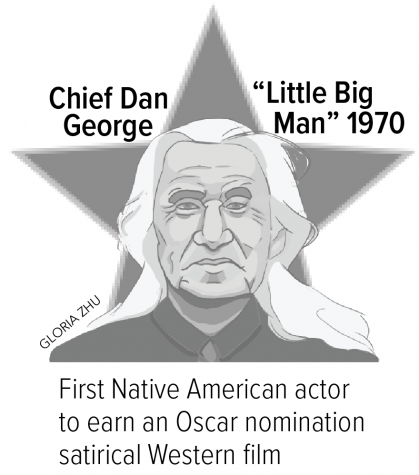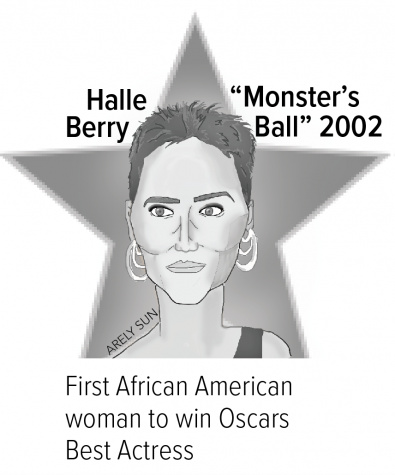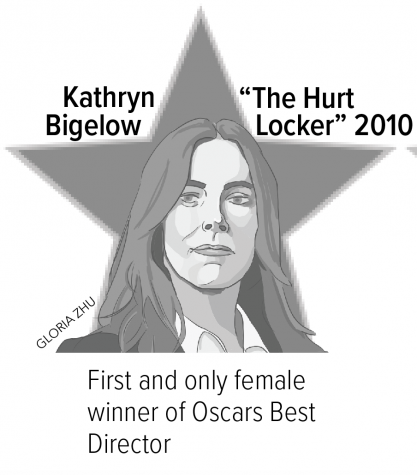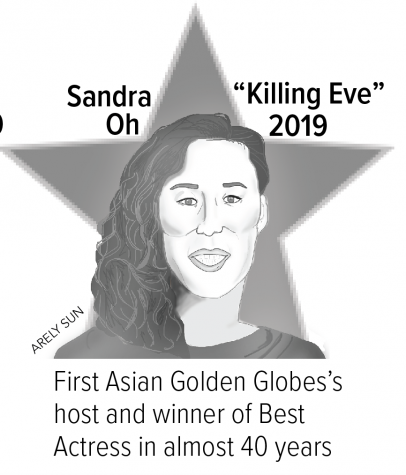Pulse of the People: Hollywood steps into inclusivity
The image of Canadian actress Sandra Oh filled the television screen as she took to the 2019 Golden Globes stage to accept her award for Best Performance by an Actress in a Television Series – Drama. Clad in a floor-length milky dress framed by aureate sleeves, she shattered two records that night.
As Oh became the first Asian host of the Golden Globes, she also became the first woman of Asian descent to win multiple Globes, the one for best supporting actress on a television series for her portrayal of Cristina Yang on “Grey’s Anatomy,” according to NBC News.
However, Oh’s achievements didn’t set her apart that night. As she concluded her acceptance speech, she finished with “Omma, appa… Saranghaeyo” and a bow to her parents. Nodding to her roots, Oh’s declaration, meaning “I love you” in Korean, earned a standing ovation from her several members in the crowd, including Joon-Soo Oh and Young-Nam Oh, her parents, who were tucked into the back of the awards ceremony.
Oh’s comment left the Golden Globes with the powerful aftertaste of social change as awareness was brought to the significant racial representation after being ignored for years in the film industry. According to a 2017 study by the USC Annenberg School for Communication and Journalism, the number of women, LGBTQ+ members and people of color depicted in media has stagnated from 2007 to 2016.
Sophomore Sarah Raymond, a Korean-American actress and singer, hopes that people can begin to adjust to seeing diverse casts featured on screen.
“Moving forward, I think the next big issue to tackle is the idea of “forced diversity” in media. People are still holding on to this antiquated idea that cisgender straight white males are the default,” Sarah said. “I’m looking forward to a time when no one will bat an eye at a character being black or gay or transgender without crying about ‘the liberal special snowflakes.’”
In 2018, national conversations surrounding inclusion and the #MeToo movement dominated the mainstream media and served as a recurring theme for the spotlight of the 2018 Golden Globes, laying a red carpet for a discussion on diversity in 2019, highlighted by several actors who advocated for more inclusion within film projects.
Associate Dean and Director of the Stanford University Diversity and First-Gen Office Dereca Blackmon shared her perspectives on the mindset of the American public as it attempts to bring in a mass era of new inclusion, reengineering the status quo after centuries.
“The American dream is a myth of equal access, and it is so hard for us to think of any possibility that we’re actually not a fair country. In other parts of the world, people know that things aren’t fair,” she said in an interview with the Winged Post. “Even though there’s lots of evidence and research and history, the belief that everyone has equal access and equal opportunity to succeed has taken us so long to get here.”
Alexander Kumar (10), a member of Downbeat and an avid performer, appreciates the steps taken so far to normalize female involvement in the film industry, yet understands that we are far from establishing a new status quo.
“I thought recent awards shows have definitely become more diverse, but the Academy seems to be unable to simultaneously be sexually and racially diverse,” said Alexander. “I think, now that we’ve overcome the whitewashing of awards shows, we need to stop giving the spotlight to men. That is not to discredit the many genius male artists out there, but the internal misogyny of awards panels needs to go.”
In the midst of subtle protest and activism, the 2019 Oscar nominations saw an influx of films including people of color. Yalitza Aparicio became the second Mexican woman to receive a best actress nomination for her work in the film “Roma,” the first being Salma Hayek in 2003. Mexican actress Marina de Tavira and African-American actress Regina King received nominations for best supporting actress for their performances in “Roma” and “If Beale Street Could Talk,” respectively. Egyptian-American actor Rami Malek was nominated for best actor for his starring role in “Bohemian Rhapsody,” and African-American actor Mahershala Ali was nominated for best supporting actor for his role in “Green Book.”
Several groundbreaking movies have premiered in the past year as well, such as “Crazy Rich Asians” which was the first movie ever to feature an all-Asian cast, and “Black Panther,” which was the first superhero movie to feature an African American lead as well as an almost entirely African American cast. Females were cast into new roles as well, with “Ocean’s 8,” a remake of “Ocean’s 11” featuring eight powerful women instead, doing phenomenally well at the box office.
Ethan Choi (10) is currently working on his third film, following the successful Crystal Heist 1 and 2, which both sprang from modest beginnings, shot fully on his iPhone 6. Seeing “Crazy Rich Asians” in theaters was an inspiring experience for him.
“Watching ‘Crazy Rich Asian’s for the first time and seeing Mandarin and Cantonese being spoken on the big screen – that for me, that made me tear up. Seeing Constance Wu and Henry Golding and Ma Jong being played, and all of these huge parts of my life that I’ve seen growing up, on screen, and knowing that people of all cultures, all around the country, could learn more about my culture and still laugh at a huge Hollywood movie, that was an amazing experience for me,” Ethan said.
Over the years, Ethan has grown as a filmmaker, embracing the newfound interest to diversity in the industry which inspires him in his own filmmaking journey every day.
“Whether or not I decide to go into filmmaking in the future, a big part of [my decision], unfortunately I have to say was about my race. Hollywood has such a stubborn culture against change. We’re seeing a lot of change, which makes me glad…but it’s always weighing on my mind. I’d just love to see more Asian actors and actors of all ethnicities come together and see them cast into these big, lead roles, and seeing cultures that haven’t been explored, on the big screen,” said Ethan.
Despite massive steps taken to combat the lack of representation in Hollywood, the Golden Globes also provided an insight into the immense progress still needed in order to “break the glass ceiling.” Four years after #OscarsSoWhite creator April Reign called for a boycott of the Academy Awards when only two people of color were nominated for an award, the entertainment business continues to struggle with a lack of diversity.
“I think that progress happens in cycles, so we’ll have a moment where we’ll see a lot of progress, and then there’ll be a backlash against this progress which i think is already happening,” said Blackmon. “Systemic change is much harder and takes a much harder time than simply raising awareness, so I do not think that that will happen to this degree.”
According to a 2019 report by the USC Annenberg Inclusion Initiative, in a sample of 1335 directors, only 80 were black and 42 were Asian. The organization also found that between the years 2017 and 2018, there were only 46 individual female directors, with only seven being women-of-color.
The report also details a list of solutions directors and producers can take in order to increase inclusion in media, which range from target inclusion goals or quotas as well as more transparency in the interviewing and hiring process in Hollywood.
“The power always comes from who has the money. Always, always, always, always,” Blackmon said. “When you’re talking about something like the movie industry, it has to do with access and making sure that there are programs that create specific access for communities that are under represented in the media. That is the only way we can create systemic change.”
With the Oscars 2019 list released in late January, several nominations in varying categories have already indicating a change in the way the industry is accommodating the new norms of racial and gender inclusion.
“Black Panther” has usurped seven nominations, and is the third most recognized movie by The Academy. It has set a new precedent as well, being the first superhero film to earn a nomination in the Best Picture category. Additionally, Netflix’s “Roma,” a black and white film shot entirely in Spanish, has been nominated in the Best Picture category as well. With the film’s nomination, Gabriela Rodriguez, co-producer of “Roma” with Alfonso Cuarón, became the first Latina to be nominated in the Best Picture category.
Alanna Mindel, the Production Manager at a small movie studio in Atlanta, GA, believes we will continue to see change.
“I love the change I’ve seen. In the past year itself, I love seeing what people have been saying about ‘Black Panther,’ even ‘Crazy Rich Asians.’ It’s crazy in a community like mine to see such diversity being accepted and even celebrated to some extent, but I think the fact that people are already becoming numb to the excitement of having an ethnic cast is a step in the right direction,” said Mindel.
As we move into 2019 and see new movies, new actors, and new awards ceremonies, Ethan is hopeful about the coming year.
“We tend to forget about the unspoken people. We need to put a face to the people who are not doing their jobs in Hollywood, but we should also put a face to all the women who are now being featured,” Ethan said. “I think that there can be more work to deliberately change the culture, but the problem is, the people at the top, if they don’t want to change the culture, the culture’s not going to change. The people at the bottom need to do something about it, and not be passive or numb.”
This piece was originally published in the pages of The Winged Post on February 20, 2019.
Varsha Rammohan (12) is the co-editor-in-chief of Harker Aquila. This is her fourth year on staff, and she likes journalism since she can meet new people...
Arushi Saxena (12) is the co-managing editor of Harker Aquila. This is her fourth year on staff, and she hopes to develop her skills as a writer, photographer...

Saloni Shah (12) is the editor-in-chief of Humans of Harker. This is her fourth year on staff. She loves to spend time with the rest of the staff and...


















![“[Building nerf blasters] became this outlet of creativity for me that hasn't been matched by anything else. The process [of] making a build complete to your desire is such a painstakingly difficult process, but I've had to learn from [the skills needed from] soldering to proper painting. There's so many different options for everything, if you think about it, it exists. The best part is [that] if it doesn't exist, you can build it yourself," Ishaan Parate said.](https://harkeraquila.com/wp-content/uploads/2022/08/DSC_8149-900x604.jpg)




![“When I came into high school, I was ready to be a follower. But DECA was a game changer for me. It helped me overcome my fear of public speaking, and it's played such a major role in who I've become today. To be able to successfully lead a chapter of 150 students, an officer team and be one of the upperclassmen I once really admired is something I'm [really] proud of,” Anvitha Tummala ('21) said.](https://harkeraquila.com/wp-content/uploads/2021/07/Screen-Shot-2021-07-25-at-9.50.05-AM-900x594.png)







![“I think getting up in the morning and having a sense of purpose [is exciting]. I think without a certain amount of drive, life is kind of obsolete and mundane, and I think having that every single day is what makes each day unique and kind of makes life exciting,” Neymika Jain (12) said.](https://harkeraquila.com/wp-content/uploads/2017/06/Screen-Shot-2017-06-03-at-4.54.16-PM.png)








![“My slogan is ‘slow feet, don’t eat, and I’m hungry.’ You need to run fast to get where you are–you aren't going to get those championships if you aren't fast,” Angel Cervantes (12) said. “I want to do well in school on my tests and in track and win championships for my team. I live by that, [and] I can do that anywhere: in the classroom or on the field.”](https://harkeraquila.com/wp-content/uploads/2018/06/DSC5146-900x601.jpg)
![“[Volleyball has] taught me how to fall correctly, and another thing it taught is that you don’t have to be the best at something to be good at it. If you just hit the ball in a smart way, then it still scores points and you’re good at it. You could be a background player and still make a much bigger impact on the team than you would think,” Anya Gert (’20) said.](https://harkeraquila.com/wp-content/uploads/2020/06/AnnaGert_JinTuan_HoHPhotoEdited-600x900.jpeg)

![“I'm not nearly there yet, but [my confidence has] definitely been getting better since I was pretty shy and timid coming into Harker my freshman year. I know that there's a lot of people that are really confident in what they do, and I really admire them. Everyone's so driven and that has really pushed me to kind of try to find my own place in high school and be more confident,” Alyssa Huang (’20) said.](https://harkeraquila.com/wp-content/uploads/2020/06/AlyssaHuang_EmilyChen_HoHPhoto-900x749.jpeg)



